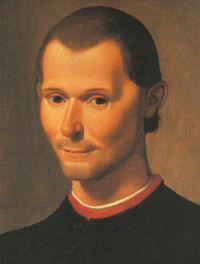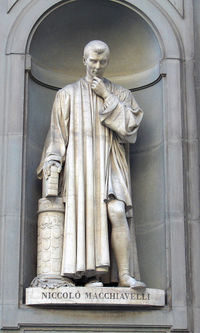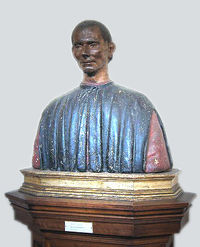Niccolò Machiavelli
2007 Schools Wikipedia Selection. Related subjects: Philosophers
| Western Philosophers Renaissance philosophy |
|
|---|---|
|
Machiavelli in the robes of a Florentine public official.
|
|
| Name: | Niccolò Machiavelli |
| Birth: | May 3, 1469 (Florence) |
| Death: | June 21, 1527 (Florence) |
| School/tradition: | Renaissance philosophy, Realism |
| Main interests: | Politics |
Niccolò di Bernardo dei Machiavelli ( May 3, 1469 – June 21, 1527) was a political philosopher, musician, poet, and romantic comedic playwright. He is a key figure of the Italian Renaissance and a central figure of its political component, most widely known for his treatises on realist political theory ( The Prince) on the one hand and republicanism ( Discourses on Livy) on the other.
Life
Machiavelli was born in May 3,1469 in the city-state of Florence, Italy. He was the second son of Bernardo di Niccolò Machiavelli and his wife. Education left him with a thorough knowledge of the Latin and Italian classics.
Machiavelli was born into a tumultuous era, in which Popes were leading armies and wealthy city-states of Italy were falling one after another into the hands of foreign powers -- France, Spain and the Holy Roman Empire. It was a time of constantly shifting alliances, condottieri who changed sides without warning, and governments rising and falling in the space of a few weeks. Perhaps most significantly during this erratic upheaval, the rise of Lutheranism culminated in the sack of Rome in 1527 at the hands of rampaging German soldiers, the first time that had occurred in nearly twelve centuries. Rich cities like Florence and Genoa suffered a similar fate in the same years. Machiavelli did not live to see the sack of Rome and Florence, but steeped as he was in the Byzantine politics of the age, it is no wonder that he turned his intelligence to analyzing the military and political events surrounding him.
He entered government service as a clerk in 1494; that same year, Florence expelled the Medici family, who had ruled the city for nearly sixty years, and restored the republic. Machiavelli was named as a member of the Council responsible for diplomatic negotiations and military matters. From 1499 to 1512, he was sent on a number of diplomatic missions to the court of Louis XII in France, Ferdinand II of Aragón, and the Papacy in Rome. From 1502 to 1503, he was a witness to the effective statebuilding methods of the soldier/churchman Cesare Borgia, an immensely capable general and statesman who was at that time engaged in enlarging his territories in central Italy through a mixture of audacity, prudence, self-reliance, firmness and, not infrequently, cruelty.
From 1503 to 1506, Machiavelli was responsible for the Florentine militia including the defense of the city. He distrusted mercenaries (a philosophy expounded at length in the Discorsi) and much preferred a citizen militia.
In August 1512, following a tangled series of battles, treaties, and alliances, the Medici with the help of Pope Julius II regained power in Florence and the republic was dissolved. Machiavelli, having played a significant role in the republic's anti-Medici government, was removed from office and in 1513 he was accused of conspiracy and arrested. Although tortured on the rack he denied his involvement and was eventually released. He retired to his estate at San Casciano near Florence and began writing the treatises that would ensure his place in the development of political philosophy.
In a famous letter to his friend Francesco Vettori, Machiavelli described how he spent his days in exile:
When evening comes, I return home [from work and from the local tavern] and go to my study. On the threshold I strip naked, taking off my muddy, sweaty workaday clothes, and put on the robes of court and palace, and in this graver dress I enter the courts of the ancients and am welcomed by them, and there I taste the food that alone is mine, and for which I was born. And there I make bold to speak to them and ask the motives of their actions, and they, in their humanity reply to me. And for the space of four hours I forget the world, remember no vexation, fear poverty no more, tremble no more at death; I pass indeed into their world.
Much has been made of the notion of two Machiavellis: one of The Prince, one of the Discorsi. But Machiavelli himself cut through the alleged confusion when he identified a unifying theme:
All cities that ever at any time have been ruled by an absolute prince, by aristocrats or by the people, have had for their protection force combined with prudence, because the latter is not enough alone, and the first either does not produce things, or when they are produced, does not maintain them. Force and prudence, then, are the might of all the governments that ever have been or will be in the world.
Machiavelli died in Florence in 1527. His resting place is unknown; however a cenotaph in his honour was placed at the Church of Santa Croce in Florence.
Works
The Prince
The Prince is different from other books about creating and controlling principalities because it doesn't tell the reader what an ideal prince or principality is, but Machiavelli explains through examples, which princes are the most successful in obtaining and maintaining power. Machiavelli draws his examples from personal observations made while he was on diplomatic missions for Florence and from his readings in ancient history. His writing has the mark of the Renaissance upon it because he sprinkles his text with Latin phrases and many examples are drawn from Classical sources.
Machiavelli's best known work is The Prince, in which he describes the arts by which a Prince can retain control of his realm. He focuses primarily on what he calls the principe nuovo or "new prince", under the assumption that a hereditary prince has an easier task since the people are accustomed to him. All a hereditary prince need do is carefully maintain the institutions that the people are used to; a new prince has a much more difficult task since he must stabilize his newfound power and build a structure that will endure. This task requires the Prince to be publicly above reproach but privately may require him to do things of an evil nature in order to achieve the greater good.
A careless reading of The Prince could easily lead one to believe that its central argument is "the ends justify the means" - which is a teleological philosophical view ("telos" is greek for ends) - that any evil action can be justified if it is done for a good purpose. This is a limited interpretation, however, because Machiavelli placed a number of restrictions on evil actions. First, he specified that the only acceptable end was the stabilization and health of the state; individual power for its own sake is not an acceptable end and does not justify evil actions. Second, Machiavelli does not dispense entirely with morality nor advocate wholesale selfishness or degeneracy. Instead he clearly lays out his definition of, for example, the criteria for acceptable cruel actions (it must be swift, effective, and short-lived). Notwithstanding the mitigating themes in The Prince, the Catholic church put the work in its Index Librorum Prohibitorum and it was viewed in a negative light by many Humanists such as Erasmus.
The term "Machiavellian" was adopted by some of Machiavelli's contemporaries, often used in the introductions of political tracts of the sixteenth century that offered more 'just' reasons of state, most notably those of Jean Bodin and Giovanni Botero. The pejorative term Machiavellian as it is used today (or anti-Machiavellism as it was used from the sixteenth century) is thus a misnomer, as it describes one who deceives and manipulates others for gain; whether the gain is personal or not is of no relevance, only that any actions taken are only important insofar as they affect the results. It fails to include some of the more moderating themes found in Machiavelli's works and the name is now associated with the extreme viewpoint.
Discorsi
If The Prince was Machiavelli's textbook on a monarchy, his Discourse on the First Ten Books of Titus Livy (which comprise the early history of Rome) is a paean to the republic. The Discorsi is a series of lessons on how a republic should be started, structured , including the concept of checks and balances, the strength of a tripartite structure, and the superiority of a republic over a principality, are as valid today as they were six centuries ago and clear applications of his practical political philosophy can be found in the governments of many democracies today, including the United States.
Other works
Machiavelli also wrote plays (Clizia, Mandragola), poetry (Sonetti, Canzoni, Ottave, Canti carnascialeschi) and novels (Belfagor arcidiavolo) as well as translating classical works.
- Discorso sopra le cose di Pisa (1499)
- Del modo di trattare i popoli della Valdichiana ribellati (1502)
- Del modo tenuto dal duca Valentino nell' ammazzare Vitellozzo Vitelli, Oliverotto da Fermo, etc. (Description of the Methods Adopted by the Duke Valentino when Murdering Vitellozzo Vitelli, Oliverotto da Fermo, the Signor Pagolo, and the Duke di Gravina Orsini, 1502)
- Discorso sopra la provisione del danaro (1502)
- Decennale primo (1506, poem in terza rima)
- Ritratti delle cose dell'Alemagna (1508-1512)
- Decennale secondo (1509)
- Ritratti delle cose di Francia (1510)
- Discorsi sopra la prima deca di Tito Livio ( Discourses on Livy - 3 vols., 1512-1517)
- Il Principe( The Prince, 1513)
- Andria (1517, comedy translated from Terence)
- Mandragola ( The Mandrake - 1518, prose comedy in five acts, with prologue in verse)
- Della lingua (1514, dialogue)
- Clizia (1525, comedy in prose)
- Belfagor arcidiavolo (1515, novel)
- Asino d'oro ( The Golden Ass - 1517, poem in terza rima, a new version of the classic work by Apuleius)
- Dell'arte della guerra ( The Art of War, 1519-1520)
- Discorso sopra il riformare lo stato di Firenze (1520)
- Sommario delle cose della citta di Lucca (1520)
- Vita di Castruccio Castracani da Lucca (The Life of Castruccio Castracani of Lucca, 1520)
- Istorie fiorentine ( Florentine Histories - 8 books, 1520-1525, commissioned by Giulio di Giuliano de' Medici who went on to become Pope Clement VII).
- Frammenti storici (1525)
Machiavelli in popular culture
- Machiavelli was ranked #79 on Michael H. Hart's list of the most influential figures in history.
- In his book Warrior Politics, author and journalist Robert D. Kaplan cites Machiavelli as a proponent of a " pagan ethos", which Kaplan feels is preferable to Judeo-Christian morality in decision-making by politicians and businessmen. It would not, however, be correct to assume that he believed in immoral acts such as genocide despite the fact that he did not always condemn them.
- In comedian Jon Stewart's satirical America: The Book, Machiavelli is listed as having "No Impact" on American Democracy.
- In her book In the Footsteps of Mr. Kurtz, journalist Michela Wrong writes that Zairian dictator Mobutu Sese Seko read Machiavelli's writings and considered him, as well as Winston Churchill and Charles de Gaulle, one of the greatest influences on his thinking.
- The satirical business book, What Would Machiavelli Do? (title a take-off of the phrase ' What would Jesus do?') by Stanley Bing.
- In the popular show Family Guy, talking-baby character Stewie Griffin is shown reading The Prince. He then throws the book across the room and screams, "Oh, Machiavelli! You've told me nothing I don't already know!"
- Hip-hop artist Tupac Shakur went by the stage name Makaveli in response to reading Machiavelli's works during his prison sentence beginning in February 1995.
- In his book The Prince of the Marshes: And Other Occupational Hazards of a Year in Iraq, Rory Stewart begins each chapter with a quote from Machiavelli.
- The card game Citadels (game) was published under the name "Machiavelli" in Belgium and the Netherlands.
- In the movie A Bronx Tale, one of the protagonists says that during his time in prison he reads Machiavelli.


